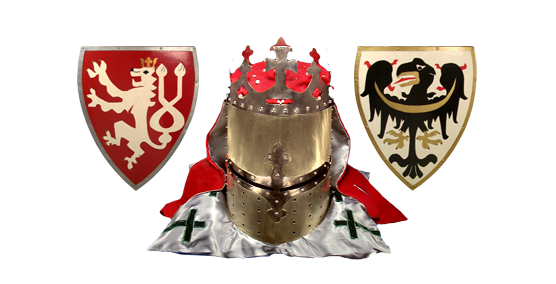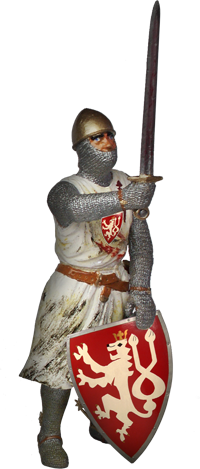History
The Golden Age of Kings
and the Bohemian State
Dear visitors,
welcome to the 13th century that - in the context of Bohemian history - was a period of chivalry Premysl Otakar II, “the Iron and Golden King, Father of Towns” who makes a symbol of greatness and power of medieval Bohemian state.
We find ourselves in the century when the Bohemian state was represented by its ruler who led brave European diplomacy. His military expansions changed Bohemian state to the most significant Central European power and its ruler was the first among others.
We find ourselves in the 13th century that could be called the century of hereditary kings of the Premyslid dynasty. The authority of Bohemian kings had risen to unprecedentedly high level. The formidable lion on the king´s red flag flied high, very high, and political decisions of Bohemian ruler were valid through vast lands from Baltic to Adriatic shores. Envoys of the king crossed European countries and reached even the distant Spain.
Deep admiration evokes following words written on Premysl´s parchments: “Otakar by the Grace of God the King of Bohemia, the Margrave of Moravia, the Duke of Austria, Styria, Carinthia and Carniola, ruler of the March Winden (Slovenia), Cheb and Pordenone”.
The Iron and Golden King
Dear friends,let us introduce our project to you, consisting of free reconstructions of battle armour and royal insignias belonging to a very honourable man. After his father he was a member of ancient noble Premyslid family - founders of Bohemian state. After his mother - a princess from the Hohenstauf dynasty - he was related to imperators of the Holy Roman Empire who dominated vast lands from ancient Russia to Spain. Thank to this relations Premysl could raise a claim upon the title “Rex et Imperator Romanorum”.
We would like to introduce a very wealthy man who during the course of his quarter-century reign never fell in financial straits. He was very proud and ambitious noble, broadminded donator fulfilling his international goals, reserved diplomat, great promoter of towns and castles (let´s mention the royal town of Ceske Budejovice and the high castle Bezdez built in the style of alpine strongholds that could be apprehend as a predecessor of the famous Karlstein castle), generous patron of arts and very brave knight (recognized even by his enemies), man who was get round by roman kings, emperors and popes. This man sleeps forever and his heroic dream is hidden under the stone grave in the ancient royal and princely seat in the heart of his nation - in the Saint Vitus Cathedral at the Prague Castle.
Premysl Otakar II fell down in the unlucky Battle of Dürnkrut in 1278. He was - according some sources - betrayed by a fraction of Bohemian high nobility but did not surrender. He was killed together with his 12.000 loyal soldiers in that lost battle against quadruple superiority of enemy alliance. It is said that his life was finished by 17 hits and his dead naked body was - in violation of imperial law - dragged along the battlefield for laughs of Bohemian enemy. So high was the hatred for Premysl.
Directly from the battlefield wrote Premysl´s opponent Rudolf of Habsburg to the pope these proud words: “... Although the king saw complete defeat of his knights and he was abandoned by his companion-in-arms, he did not withdraw before our victorious banners. He fought with brave spirit and courage in spite of wounds caused to him by our knights and fallen warhorse under him. Finally the glorious king lost his life together with victory...”
Even the most powerful European ruler of his time, Roman emperor Charles IV consider his progenitor Premysl Otakar II to be the most considerable ancestor and acclaimed his legacy.
The fame of great Bohemian knightly “Iron and Golden King” lasted for centuries.

Last words...
We are closing an imaginary door to Bohemian history of the 13th century when the Bohemian state raised itself to unprecedented power, wealth and fame. The mortal scream of Bohemian troops, neigh and thud of warhorses are fading away together with ringing of church bells. We believe that these vibrations are harmonized in your souls at least for a while and you feel admiration and pride in the history of Bohemian country in the heart of Europe. This land was always a coherent part of Europe and the Czech nation deeply influenced European history by its bravery and craft.



